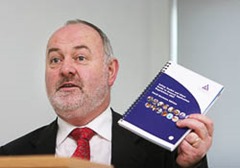Pioneering reform
 ACESA Chairman Martin O’Halloran outlines how its members are leading by example and delivering on reform within the Public Service.
ACESA Chairman Martin O’Halloran outlines how its members are leading by example and delivering on reform within the Public Service.
In this short article I’d like to tell you what the Association of Chief Executives of State Agencies (ACESA) is, what we do, how we operate as a support, reform and improvement network and our hopes for the future.
ACESA is a network of 80 chief executives of non-commercial State agencies. It is a networking and sharing group committed to driving improvements in public sector management and performance.
The member agencies account for 8,000 people, less than 3 per cent of public sector staffing and about 2 per cent of the public sector budget. However, the work of non-commercial State agencies affects every citizen and every business in the State.
Services provided by ACESA member organisations include:
• regulating and setting standards for economic activities and improving safety on our roads, our workplaces, our food, our waterways, our transport, our health products and healthcare;
• protecting citizens, workers, consumers and business and acting as advocates on their behalf in seeking redress (human rights, equality, citizen information, legal aid, business supports etc);
• driving improved standards in the professions (health, social care and teaching);
• managing cultural, heritage, sporting and vital national assets; and
• supporting and promoting the interest of Irish business nationally and internationally.
The exchange of ideas, experiences and practical approaches to problem-solving among members is achieved through a series of regular early morning meetings and briefings where topical speakers are invited to explore an area of interest to the members followed by engaged dialogue.
There has been a particular focus over the last number of years on exploring aspects of service delivery, reform and organisational transformation. Areas explored include: ICT, insourcing, outsourcing, performance management, development of smart performance indicators, development of service level agreements, collaboration between agencies and other State organisations (bilateral and multi-lateral working), improved procurement practices, use of social media. This exchange of ideas and practical experiences is also supported through conferences, member surveys and meetings of sectoral sub-groups e.g. cultural institutes, health and social care regulators, economic regulators and ad-hoc bilateral meetings.
ACESA also arranged an international conference in 2013 which brought together agency leaders and academics from across Europe with a view to capturing current thinking and change that is happening internationally. Through this conference and ongoing international peer groups which ACESA members are embedded in, we are aware of the international trends and are willing to embrace and lead on new ideas and research.
 Members are committed to reform and have been working to reform and transform their organisations to improve their service offerings and how they do their business. They are committed to innovation in service delivery reform whilst also consulting and listening to service users, customers and business on how to achieve continuous improvements. ACESA members are particularly well-positioned to drive change, reform and continuous improvement due to the scale of their organisations, their clear mandates, their sharp focus on operational delivery of services, and their regular and direct contact with citizens and business
Members are committed to reform and have been working to reform and transform their organisations to improve their service offerings and how they do their business. They are committed to innovation in service delivery reform whilst also consulting and listening to service users, customers and business on how to achieve continuous improvements. ACESA members are particularly well-positioned to drive change, reform and continuous improvement due to the scale of their organisations, their clear mandates, their sharp focus on operational delivery of services, and their regular and direct contact with citizens and business
Members have significant work experience not only in the public sector but in the private, the academic and not-for-profit sectors. Individually and collectively, they have vast experience in policy formulation and service delivery across all areas of the economy. They manage organisations of different sizes and complexity with clearly defined mandates set out in legislation. They have developed strategies and visions for change aimed at efficient and effective delivery of improved services.
Initiatives taken by member agencies include but are not limited to:
1. agencies being at the forefront of electronic service delivery, communications using modern technology and communications channels, outsourcing non-core functions, insourcing, shared public procurement processes, and the development of clear and accessible customer charters in the Public Service;
2. shared service delivery and collaboration through inter-agency working (this is based on agreed service level agreements and memorandums of understanding); and
3. agencies working across departments and helping to break down silos which are widespread in the Civil Service.
The fact that over the last six years ACESA member organisations have experienced disproportionate reductions in resources has sharpened the need for and success in the reform processes. Reductions have been at the higher end of those in the wider Public Service (people and budget) in the order of
25 per cent.
ACESA has actively supported the work of government and especially so over recent years and has made a number of submissions on reform initiatives e.g. accountability of the Civil Service and appointments to State boards. We welcome these initiatives and the moves towards openness and transparency.
Future plans
For the future, ACESA would like to see continued reform in the delivery of public services. We welcome the establishment of the Senior Public Service but we would like to see it quickly extended to the wider public sector including agencies, to capitalise on the breadth of experience available.
We welcome the openness, objectivity and depoliticisation emerging in appointments to public sector boards. We would like to see this extended across all non-commercial State boards.
We welcome the recent launch of the Civil Service reform programme and we would like to see this extended to the wider Public Service as many of the proposed changes are already being practised in the agencies. Using the 80 CEOs and their organisations as a rich collection of wisdom, knowledge, skill, and expertise, this richness could help to shape the contours of the public sector landscape in the years ahead.
We would like to see the full implementation of the findings of the Rafter report on accountability. In particular we would like to see the recommendations on agencies in Chapter 7 of the report being progressed speedily.
Most importantly, we would like to see the leadership role of the CEO in an agency fully valued and central control and micro-management from the centre replaced by sound corporate governance structures. The executive teams in agencies should be leading with vision and courage within the Public Service but providing services in a complete and joined-up manner.
We would like to see a model for recognition of excellence, a public sector with career opportunities for people with diverse skills, a career path for real professional development and opportunities to rotate between the broader public and private sectors.
In order to revitalise the public sector a new generation needs to be recruited as the current age profile will result in serious loss in corporate knowledge and experience. There is also a pressing need to create space for new and original thinking in the public sector.
In conclusion, non-commercial State agencies have been leaders in reform and transformation in the delivery of public services. They have the vision, the commitment, the agility and the appetite for change. We look forward to the journey of continuous improvement in delivery of citizen-centred services.
Martin O’Halloran is Chairman of ACESA and Chief Executive of the Health and Safety Authority.

